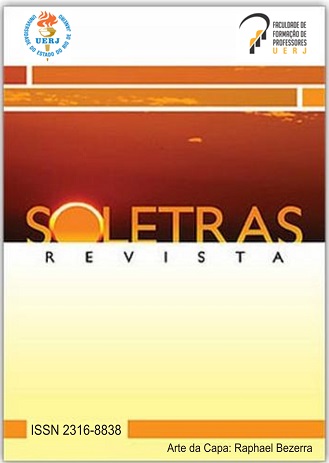Os estudos de português em Portugal e no Brasil: perspectivas historiográficas
DOI:
https://doi.org/10.12957/soletras.2025.88438Palavras-chave:
Historiografia linguística, Gramaticografia quinhentista e oitocentista, Prólogo, OrtografiaResumo
Duas obras gramaticais importantes para dois períodos de grande relevância para a Língua Portuguesa, em Portugal e no Brasil (João de Barros, 1540 e Antônio Álvares Pereira Coruja 1835). Buscamos entender em que medida as obras interferiram no seu tempo para a permanência e a promoção da Língua Portuguesa em épocas e lugares diversos. Esta investigação, centrando‑se na Historiografia da Linguística e aderindo aos princípios teórico metodológicos de Koerner (2014) e Swiggers (1990), corroborados por Batista (2020), Bastos (2020), enfoca o prólogo das duas obras gramaticais do passado linguístico português imbricado ao brasileiro nos séculos XVI e XIX, objetivando entender o clima de opinião e as intenções linguísticas e pedagógicas no que tange ao prólogo e a aspectos do ensino da ortografia. Toma por base as concepções linguísticas, educacionais e culturais dos dois momentos, buscando delinear as ideias sobre a linguagem e as propostas de descrição e explicação dadas pela gramaticografia lusófona em contexto pedalinguístico quinhentista e oitocentista.
Downloads
Publicado
Edição
Seção
Licença
A aprovação dos artigos implica a cessão imediata e sem ônus dos direitos de publicação nesta revista. O(s) autor(es) autoriza(m) ao Programa de Pós-graduação em Letras e Linguística (PPLIN) a reproduzi-lo e publicá-lo na revista SOLETRAS, entendendo-se os termos “reprodução” e “publicação” conforme definição do artigo 5° da Lei 9610/98. O(s) autor(es) continuará(rão) a ter os direitos autorais para publicações posteriores. O artigo poderá ser acessado pela rede mundial de computadores (http://www.e-publicacoes.uerj.br/index.php/soletras), sendo permitidas, a título gratuito, a consulta e a reprodução de exemplar do artigo para uso próprio de quem o consulta. Casos de plágio ou quaisquer ilegalidades nos textos apresentados são de inteira responsabilidade de seus autores.



